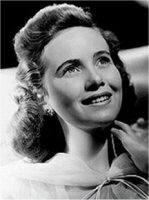In Remembrance: Teresa Wright
 Teresa Wright, the only actor to be nominated for Academy Awards for
her first three film appearances, has passed away on Sunday March 6,
2005 in New Haven, Connecticut. She was 86.
Teresa Wright, the only actor to be nominated for Academy Awards for
her first three film appearances, has passed away on Sunday March 6,
2005 in New Haven, Connecticut. She was 86.
Born Muriel Teresa Wright on October 27, 1918 in Manhattan, Wright’s parents separated soon after she was born. Her father was an insurance salesman who frequently left her in the care of various relatives in New York and New Jersey. After she saw Helen Hayes on Broadway in a production of Victoria Regina, Wright was inspired to become an actress. In high school, she took the lead in several school plays, eventually landing a scholarship the summer of her junior year at the Wharf Theater in Provincetown, Massachusetts with the help of a teacher. Her study at the theater led to work in summer stock productions and finally to an understudy role in the 1939 Broadway production of Our Town. She then landed the role of Mary in Life With Father, based on the memoirs of Clarence Day.
It was during her run in Life With Father that producer Samuel Goldwyn saw her and going backstage (some say at the prompting of playwright Lillian Hellman), approached her with the role of Bette Davis’ daughter in the upcoming production The Little Foxes (1941). Wright accepted. Once in Hollywood, Wright so impressed the film’s director, William Wyler, that he described her as “the most promising young actress he had ever directed” in a New York Times interview. Wright would be nominated for an Academy Award for best supporting actress for her work in the film.
Her next picture was Pride Of The Yankees (1942), where she starred opposite Gary Cooper as Lou Gehrig’s wife. She followed that with a supporting turn as the love interest of Greer Garson’s war bound son in Mrs. Miniver (1942). She received Oscar nominations for both roles, winning the Best Supporting Actress award for Mrs. Miniver.
She also appeared in Alfred Hitchcock’s Shadow Of A Doubt (1943) and Wyler’s Best Years Of Our Lives (1946).
Wright was very cautious in controlling her image, both on screen and off. Her roles were always that of the wholesome wife, daughter or girlfriend. She never played a vamp or seductress. She was reticent about granting interview to fan magazines or doing publicity for her various films. Her contract stipulated that she would not be required to pose for promotional bathing suit or cheesecake photos. She never saw herself as the glamorous type and instead wanted people to concentrate on her acting.
Although Goldwyn initially went along with her wishes not to limit her participation in the publicity demands of the film business at the time, the producer would become increasingly demanding until 1948, when he fired her after a highly public exchange. “I will gladly work for less if by doing so I can retain the common decency without which the most acclaimed job becomes intolerable,” Wright told the Los Angeles Times in an interview at the time. At the time, she was earning $125,000.00 per picture.
Holding true to her word, she only received $20,000.00 for her next film, 1950’s The Men, which co-starred Marlon Brando in his first screen role. She would make 10 more films during that decade, though none were particularly remarkable. Instead, Wright concentrated on stage work and would only take an occasional film or television role. She was nominated for two Emmys for her television work- once in 1958 for a performance on the anthology series Playhouse 90, and again in 1989 for a guest appearance on the series Dolphin Cove.
Wright’s last film was 1997’s The Rainmaker, adapted from the John Grisham bestseller.